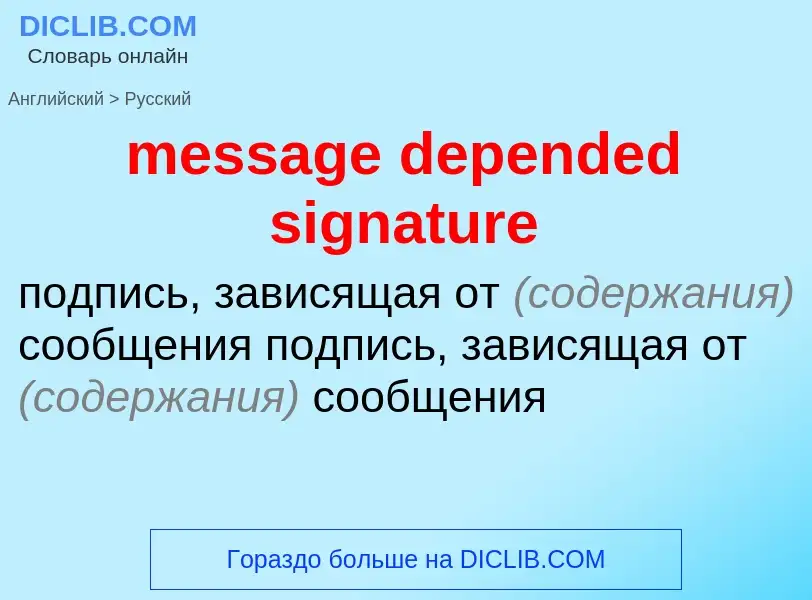Перевод и анализ слов искусственным интеллектом ChatGPT
На этой странице Вы можете получить подробный анализ слова или словосочетания, произведенный с помощью лучшей на сегодняшний день технологии искусственного интеллекта:
- как употребляется слово
- частота употребления
- используется оно чаще в устной или письменной речи
- варианты перевода слова
- примеры употребления (несколько фраз с переводом)
- этимология
message depended signature - перевод на русский
математика
сигнатура метрики
['signɔtʃə]
общая лексика
сигнатура
специфическое содержимое памяти, характеризующее объект, например компьютерный вирус
отличительный признак
подпись
ставить подпись, подписывать
сигнатурный
нефтегазовая промышленность
рисунок волны, форма волны (на сейсмограмме)
синоним
существительное
['signətʃə]
общая лексика
(собственноручная) подпись
автограф
подписание
музыкальная шапка (радиопрограммы и т. п.)
подпись
полиграфия
сигнатура
сфальцованный печатный лист
музыка
ключевые знаки
ключ
радиотехника
музыкальная шапка
глагол
общая лексика
подписывать
ставить подпись
полиграфия
ставить сигнатуру
['signət(ə)ri]
прилагательное
юриспруденция
подписавший
принявший участие в подписании
существительное
['signət(ə)ri]
общая лексика
подписавшийся
сторона, подписавшая какой-л. документ (особ. договор)
юриспруденция
подписавшееся государство
подписавшаяся сторона
['taimsignətʃə]
существительное
музыка
тактовый размер
общая лексика
передача сообщений, обмен сообщениями
один из двух способов организации взаимодействия между параллельными процессами (другой - shared memory)
Определение
Википедия
A digital signature is a mathematical scheme for verifying the authenticity of digital messages or documents. A valid digital signature, where the prerequisites are satisfied, gives a recipient very high confidence that the message was created by a known sender (authenticity), and that the message was not altered in transit (integrity).
Digital signatures are a standard element of most cryptographic protocol suites, and are commonly used for software distribution, financial transactions, contract management software, and in other cases where it is important to detect forgery or tampering.
Digital signatures are often used to implement electronic signatures, which includes any electronic data that carries the intent of a signature, but not all electronic signatures use digital signatures. Electronic signatures have legal significance in some countries, including Canada, South Africa, the United States, Algeria, Turkey, India, Brazil, Indonesia, Mexico, Saudi Arabia, Uruguay, Switzerland, Chile and the countries of the European Union.
Digital signatures employ asymmetric cryptography. In many instances, they provide a layer of validation and security to messages sent through a non-secure channel: Properly implemented, a digital signature gives the receiver reason to believe the message was sent by the claimed sender. Digital signatures are equivalent to traditional handwritten signatures in many respects, but properly implemented digital signatures are more difficult to forge than the handwritten type. Digital signature schemes, in the sense used here, are cryptographically based, and must be implemented properly to be effective. They can also provide non-repudiation, meaning that the signer cannot successfully claim they did not sign a message, while also claiming their private key remains secret. Further, some non-repudiation schemes offer a timestamp for the digital signature, so that even if the private key is exposed, the signature is valid. Digitally signed messages may be anything representable as a bitstring: examples include electronic mail, contracts, or a message sent via some other cryptographic protocol.




![String Quartet No. 2 in F major]], showing a multiple time signature String Quartet No. 2 in F major]], showing a multiple time signature](https://commons.wikimedia.org/wiki/Special:FilePath/Tchaikovsky String Quartet in F excerpt.png?width=200)
